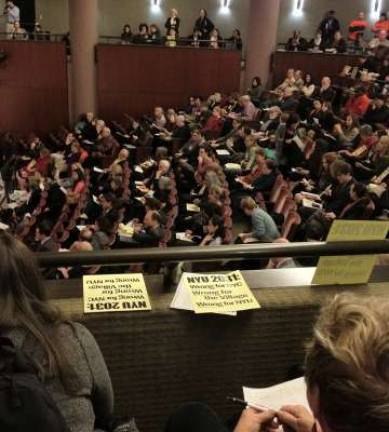NYU Expansion Hearing Brings Public Concerns to Light

by Mike Vidafar Borough President's Compromise Not Enough to Sway Public Opinion On Wed. afternoon (4/25), the City Planning Commission (CPC) held a public hearing at the Museum of the American Indian to hear both concerns and support over the NYU Sexton Plan ? a project that would radically expand the NYU campus over a 20 year period. CPC members heard the raised, and sometimes distressed voices of community members who were against the plan, as the standing room only "crowd" gave raucous applause to members speaking out against the expansion, and provided a chorus of hisses and even outraged shouts to those advocating it. Members of NYU Faculty weighed in on both sides of the coin. Mary Schmidt Campbell, Dean of the Tisch School of the Arts, advocated on behalf of the plan, citing a lack of performance space and the need to remain competitive as universities around the country put additional pressure on the already taxed School of the Arts. "We've achieved at the highest level and contributed to the creative economy of downtownNew Yorkin spite of the fact that Tisch's Institute for Performing Arts has, for years, struggled with inadequate, obsolete, sometimes dangerous, and cramped facilities?Our existing facilities are at a crisis point. In order to continue to thrive, we've embarked on an ambitious plan to design the world's finest performing arts training center as part of the 2031 plan." Other faculty members were not so supportive of the expansion, which makes The Tisch School seem more like an outlier when compared to many other departments and faculty at the university. However, less than one third of NYU faculty have chosen to publicly align themselves. Despite concerns over anonymity, a senior faculty member, who was introduced improperly, spoke out against the Sexton Plan, urging the CPC to say "N-O" until they "K-N-O-W" more. "The NYU leadership would have you believe that the university can't fulfill its educational mission and be a global leader without anEmpire State Building's worth of square footage squeezed into a few blocks. But the NYU team pushing this plan does not speak for its faculty; for we, too, are the university." "As of today, 20 academic departments and programs, including the Department of Economics (which might know something about something) have passed resolutions against this plan overwhelmingly." More than anything, however, the public hearing revealed a poor dissemination of information. Many attendees representing NYU and its expansion plan seemed unable to adequately describe different phases of the plan when pressed by the commission, and there was also an apparent disconnect between those who spoke on behalf of the Sexton plan sans "Stringer's Compromise" and those who spoke exclusively of it ? which NYU President Sexton agreed to on Apr. 11. Speaking on behalf of the Greenwich Village Society for Historical Preservation (GVSHP), lawyer Randy Mastro urged the CPC to consider the usage of space, and the impact it will have on Greenwich Village. "This commission is being asked to approve over 2.2 million gross square feet of construction over the next nineteen years that will fundamentally change the character of one of our city's most beloved neighborhoods ? Greenwich Village?yet hundreds of thousands of square feet of this project are not for academic purposes," "As a result of this construction, this neighborhood will have to accommodate up to 2,000 new residents, and find itself flooded with more than 10,000 new people visiting the area every day. It will substantially reduce the amount of open space available for community use in an area already lacking such open space." [caption id="attachment_44845" align="alignleft" width="300" caption="Members of the Public Hearing show their opposition to the Sexton Plan"](http://nypress.com/wp-content/uploads/2012/04/4.jpg)[/caption] While nearly all of the community members present at the hearing were opposed to the Sexton plan, Manhattan Borough President Scott Stringer's Director of Land Use, Brian Cook, spoke on behalf of Stringer, bringing to light many of the Borough President's amendments ? some of them for the first time to the CPC. "The office [of the Borough President] has maintained a philosophy of seeking ways to strike a balance to ensure that development, when it is occurring, does not overrun or take away things and hurt the community in ways that we can prevent," And as he outlined the Borough President's amendments, Cook commented on the President's decision to dissuade NYU from building "below-grade" below street level) around parks was perhaps the most popular opposing point made at the hearing. "The clear direction we heard from the community was taking the below-grade of those parks [Northern Mercer St. Park, Western Mercer St. Park] and tearing out the old trees and what existed, even if they were eventually replaced was an unacceptable line." However, when pressed by the City Planning Commission and the community for information regarding the concessions NYU was unwilling to make at President Stringer's urging, Mr. Cook declined to comment. [caption id="attachment_44846" align="alignleft" width="300" caption="Members of the City Planning Commission, including Chairperson Amanda Burden"](http://nypress.com/wp-content/uploads/2012/04/3.jpg)[/caption] As it stands, the City Planning Commission has, at the present time, many more questions than it does answers. In light of the tremendous public opposition to the project, as well as the points raised by several community speakers, it does not appear likely that the CPC will approve the Sexton Plan without at least first requesting a full disclosure and review of Stringer's Compromise. "It's important that the commission to hear the modifications that the borough president recommended," said City Planning Commission Chair Amanda M. Burden.